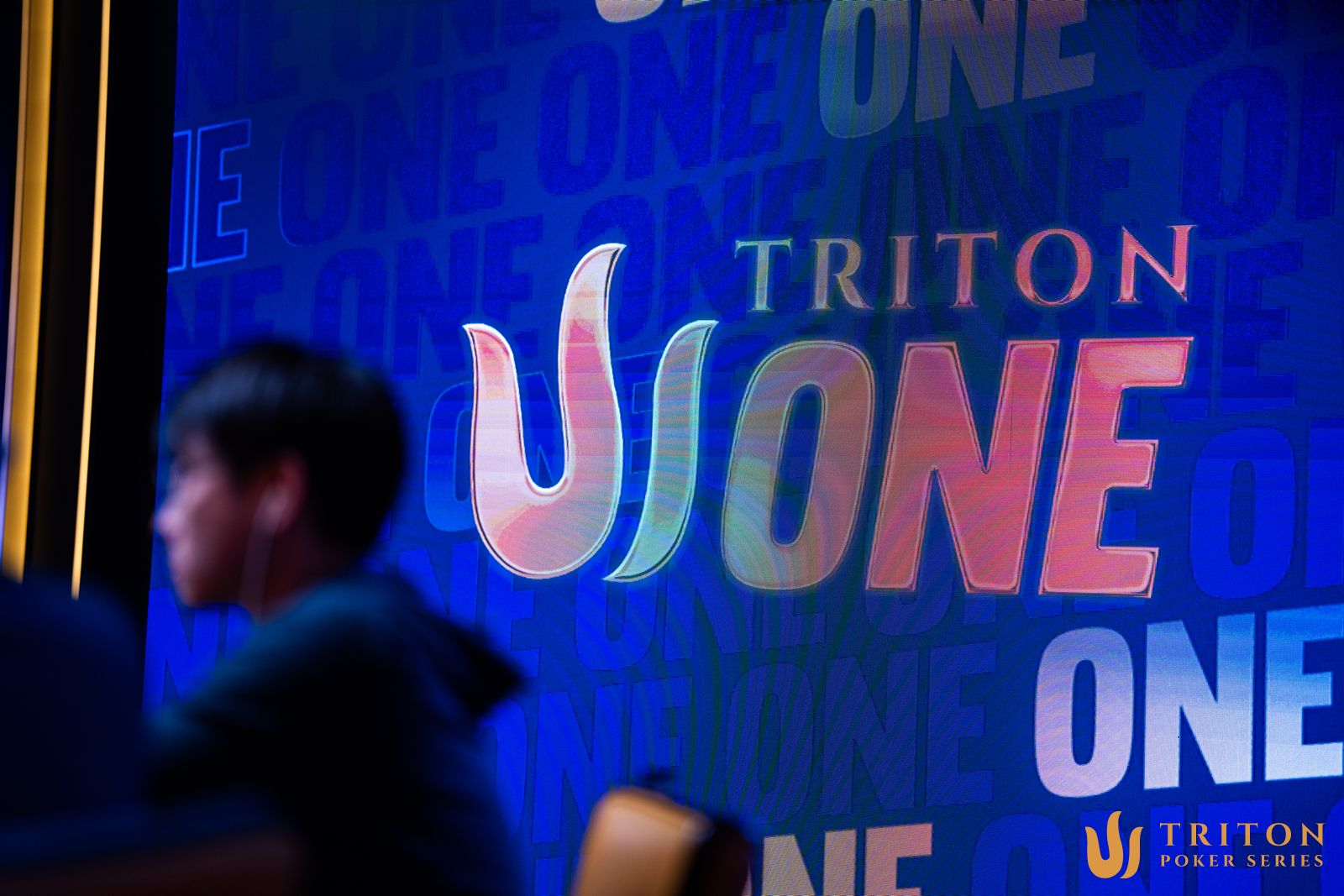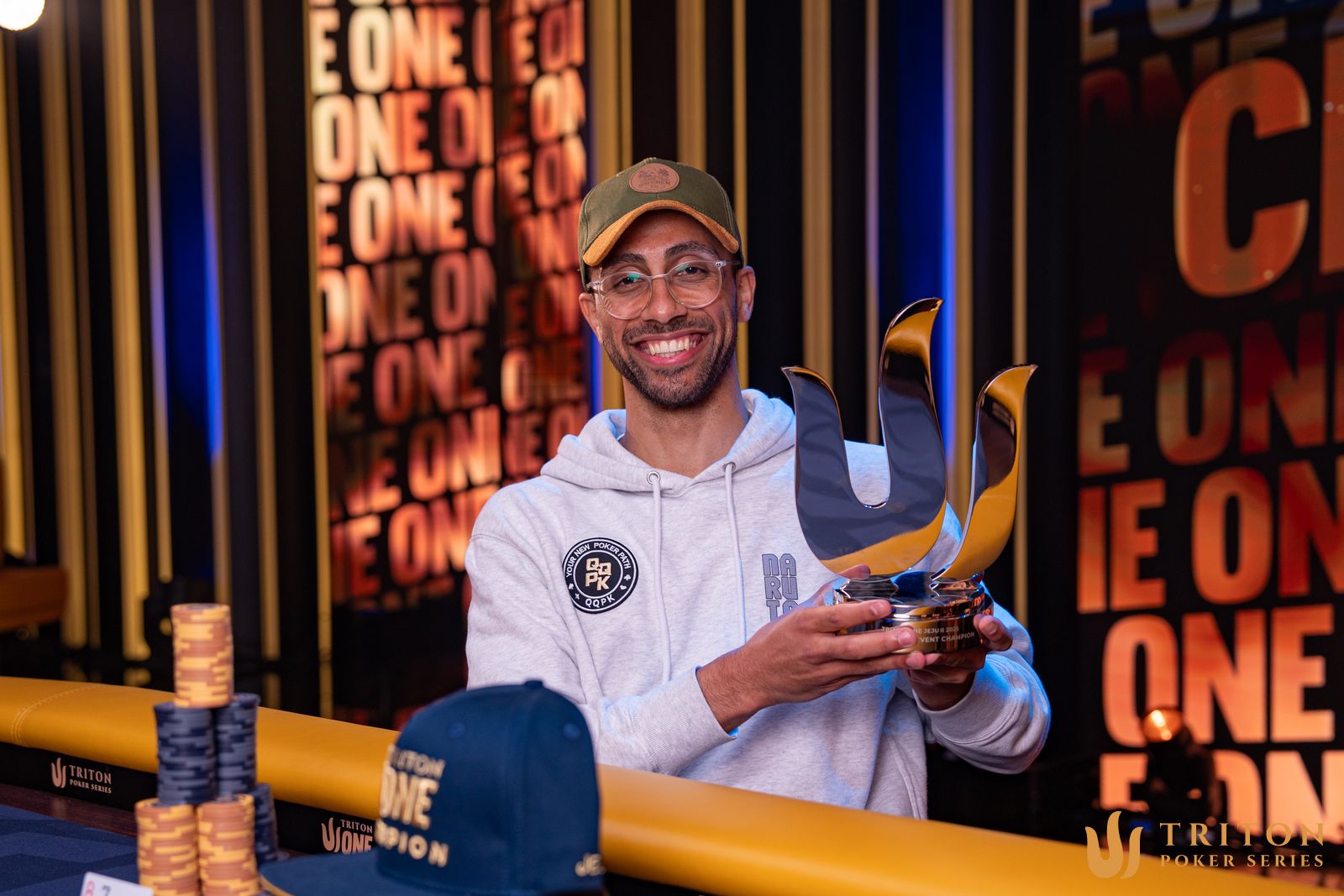

Champion Joshua Gebissa
"Where legends are born." It says it right there in the Triton ONE slogan. And tonight in Jeju, South Korea, the population of Triton Poker Series legends increased by one.
Joshua Gebissa, a 30-year-old Vienna-based German, squared off across the final table of the enormous inaugural $8,000 Triton ONE Main Event and looked at Punnat Punsri, a four-time Triton Super High Roller Series champion, and No 1 on the Thailand all-time money list.
Not only that, Punsri was running as hot as the sun and had an enormous chip lead.
But, crucially, nothing is insurmountable in poker. Not the chip lead. And not the entry gate to the Super High Roller world. Gebissa slowly and steadily reined in Punsri until it was Gebissa's fingers wrapped around the spectacular Main Event trophy, and his bankroll was boosted by $975,225.
By that point, the pair had already arranged a deal, negotiated while Punsri was in that vast lead. It was reflected in the $1,205,775 Punsri locked up, more than the eventual champion. But that didn't matter. Gebissa is the first champion on this brand-new tour, and it couldn't have a more down-to-earth winner.
"I was kind of happy to play with him," Gebissa said of Punsri, moments after sealing his victory. Gebissa explained that he'd got to know Punsri, a man he'd previously only watched on the Triton streams, the day before, and found him to be a gentleman.
"Kind of a legend of the game, to play him heads up versus him for a big trophy, can't get much better than this, I think," Gebissa said.
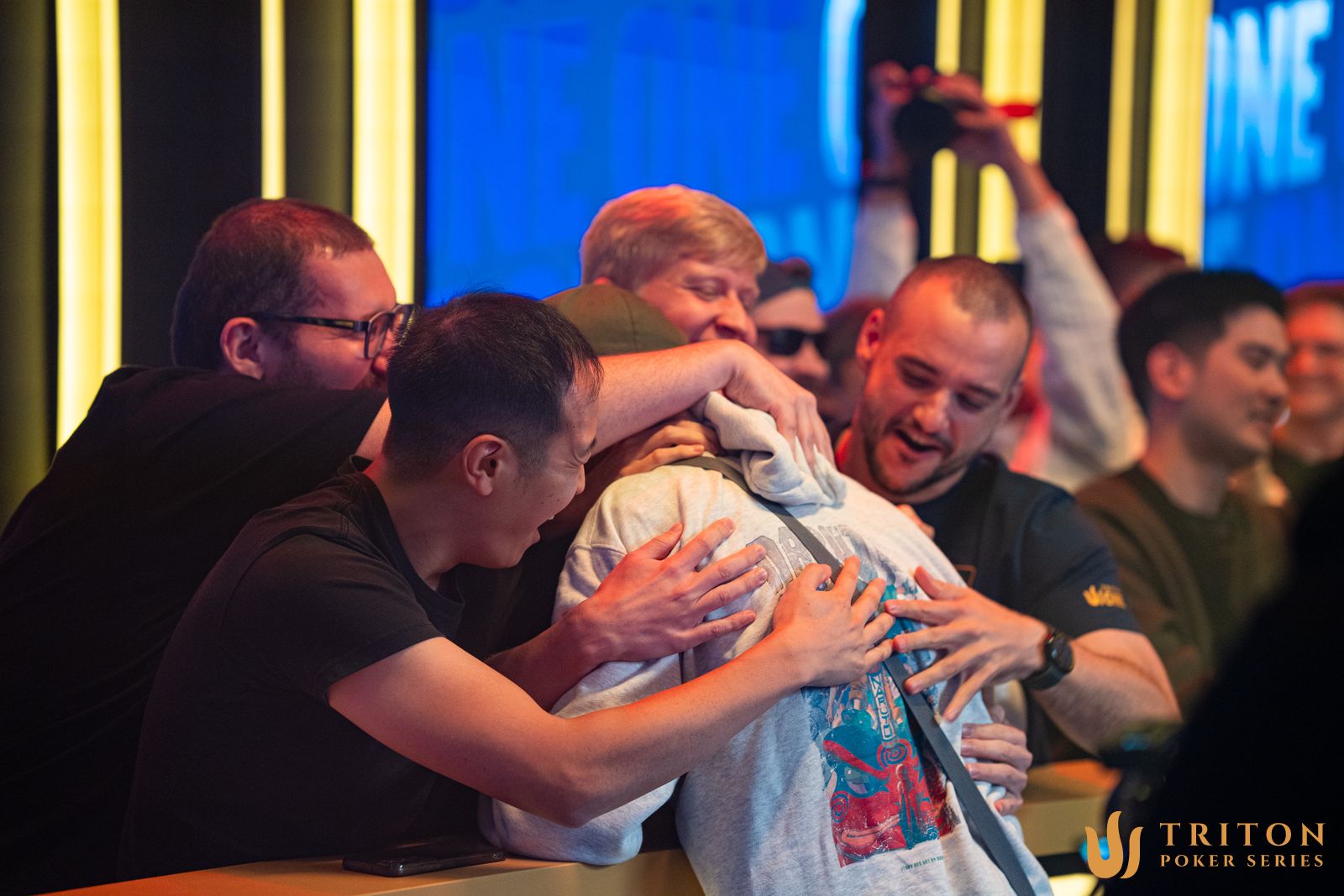

Celebrations start for Joshua Gebissa
Coming into the final, Gebissa said he had a plan to "see how the table played" and then be patient and pick the right spots. It couldn't have worked more effectively.
"People just busted each other and I didn't need to do much," he said.
Punsri did the lion's share of the damage at the final, knocking out the similarly dangerous Artur Martirosian, then pulling off a devastating hero call to effectively end the potent challenge of Japan's Daiki Shingae.
But when it all got incredibly unpredictable in the closing stages, it was Gebissa who survived the tumult to become a popular first Triton ONE champion.
He'll return to the poker hotbed of Vienna with a reputation burnished by his appearance here. And with an additional $100,000 coming his way thanks to Triton ONE title sponsors QQPK, the Super High Roller Series will look clearly in reach.
TOURNAMENT ACTION
Through two opening flights, the Triton ONE Main Event entry figure ticked steadily toward four figures. Day 1A welcomed 520 entries, Day 1B added another 526. It put $7,607,558 in the prize pool and promised $1.367 to its winner.
As it always does, the field contracted rapidly towards the crucial in-the-money stage, and the first ever Triton ONE Main Event bubble was suitably wild, with vast scrums of players and media following no fewer than nine players at risk during three simultaneous hands.
The tournament paid 167 places, but with 169 players still seated and hand-for-hand play not yet initiated, four players were all=in and at risk. If at least two were knocked out, the bubble would burst before it even inflated.
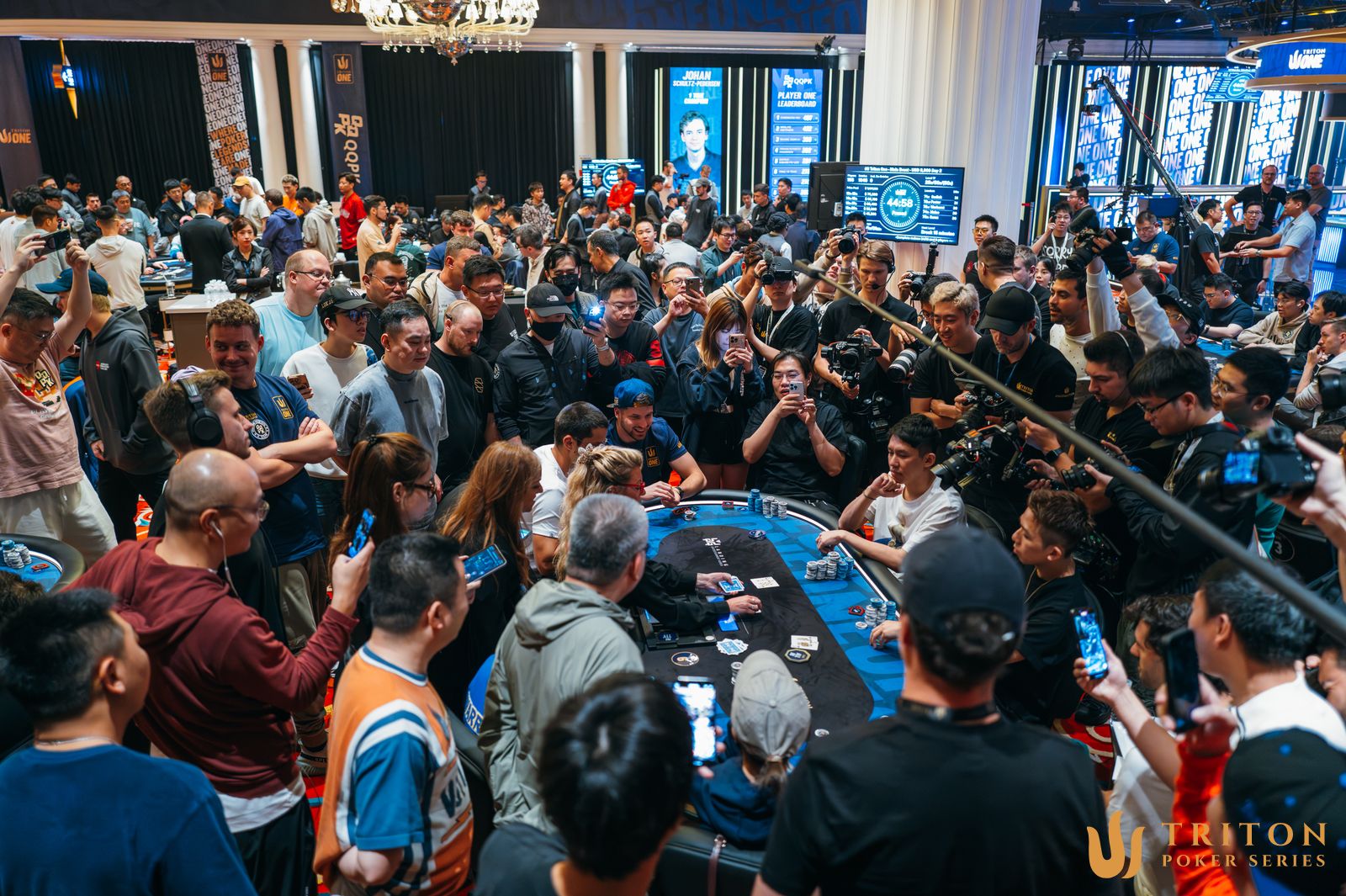

Chaos on the Triton ONE bubble
It started briskly. Ye Li and Mehdi Chaoui were in the blinds and Chaoui three-bet Ye's opening raise. Ye called to see a flop of 6KJ. Ye then check-jammed the last of her 20 blind stack. Chaoui called, but the pair had to wait for hands to finish elsewhere before revealing their cards.
When that process was eventually complete, a chill air swept past this table at what amounted to a dastardly cooler. Ye had flopped two pair with JK but Chaoui's pocket kings had flopped a set. Ye was drawing incredibly thin, and was dead on the turn. After all three other called all-ins resulted in double-ups for the at-risk players, Ye could no longer even hope for a chop of the 167th-place prize money.
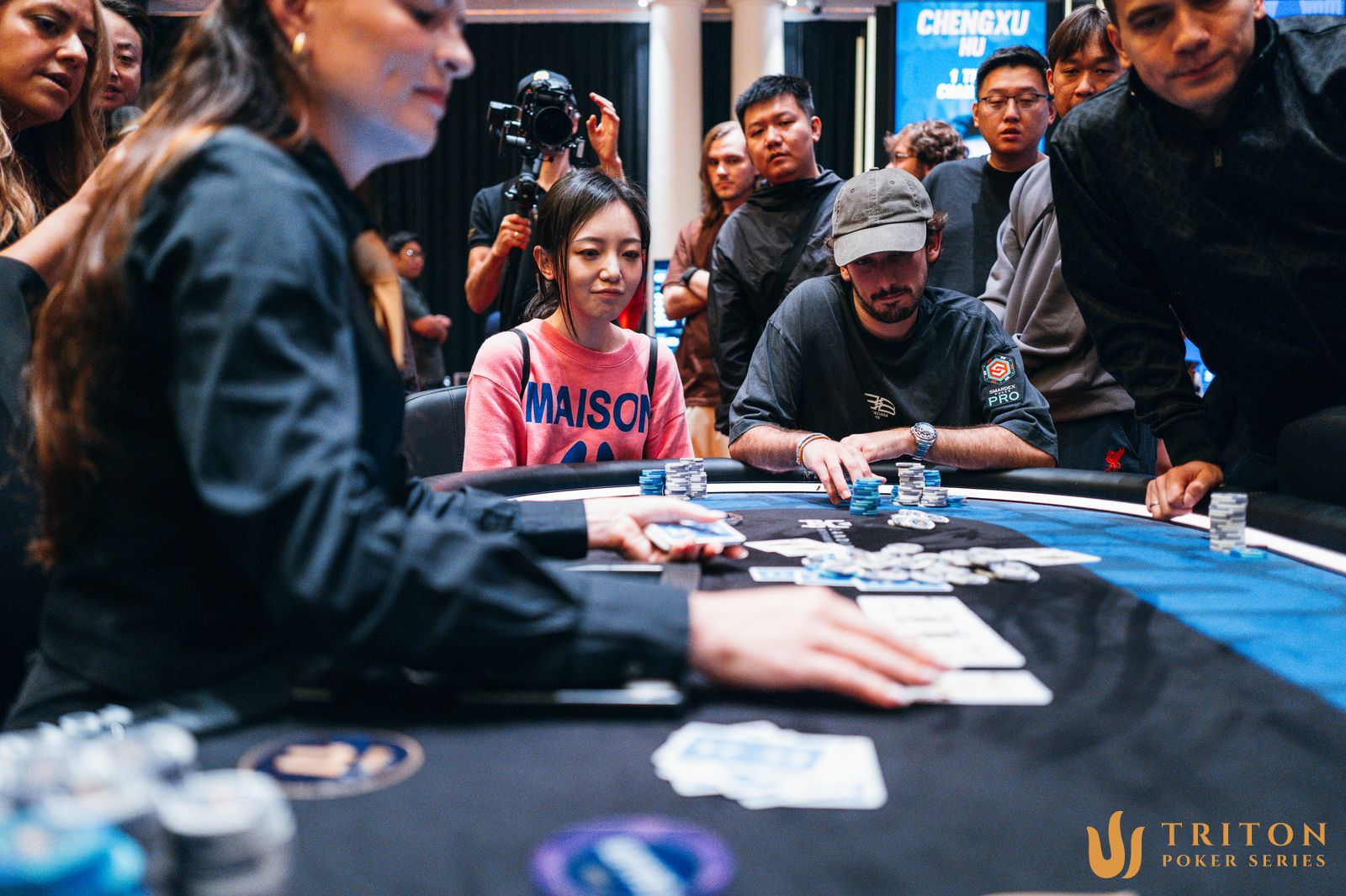

Li Ye departs
Dealers now began hard hand-for-hand play, and immediately three more players were all-in and at risk. Ren Lin had been pacing the room to follow all the previous coups and the only way to keep him in his seat was for him to be directly involved in a hand. Which he soon was. Deeply.
"I am bubble boy," Lin proclaimed as he found himself at risk against Jia-Chi Li. His was the first of the three hands to play out, but he got his pocket kings to hold up against Li's 86 and he stayed alive. So, however, did both other all-in players, which took us to another hand.
It was especially bleak news for Yuan Xu, whose micro-stack was not enough to give him anything more than a big blind. Han Shao limped from the button, Daniel Rezaei completed from the small blind, and with his last chips already committed, Yuan could do nothing but protect his cards and hope for the best.
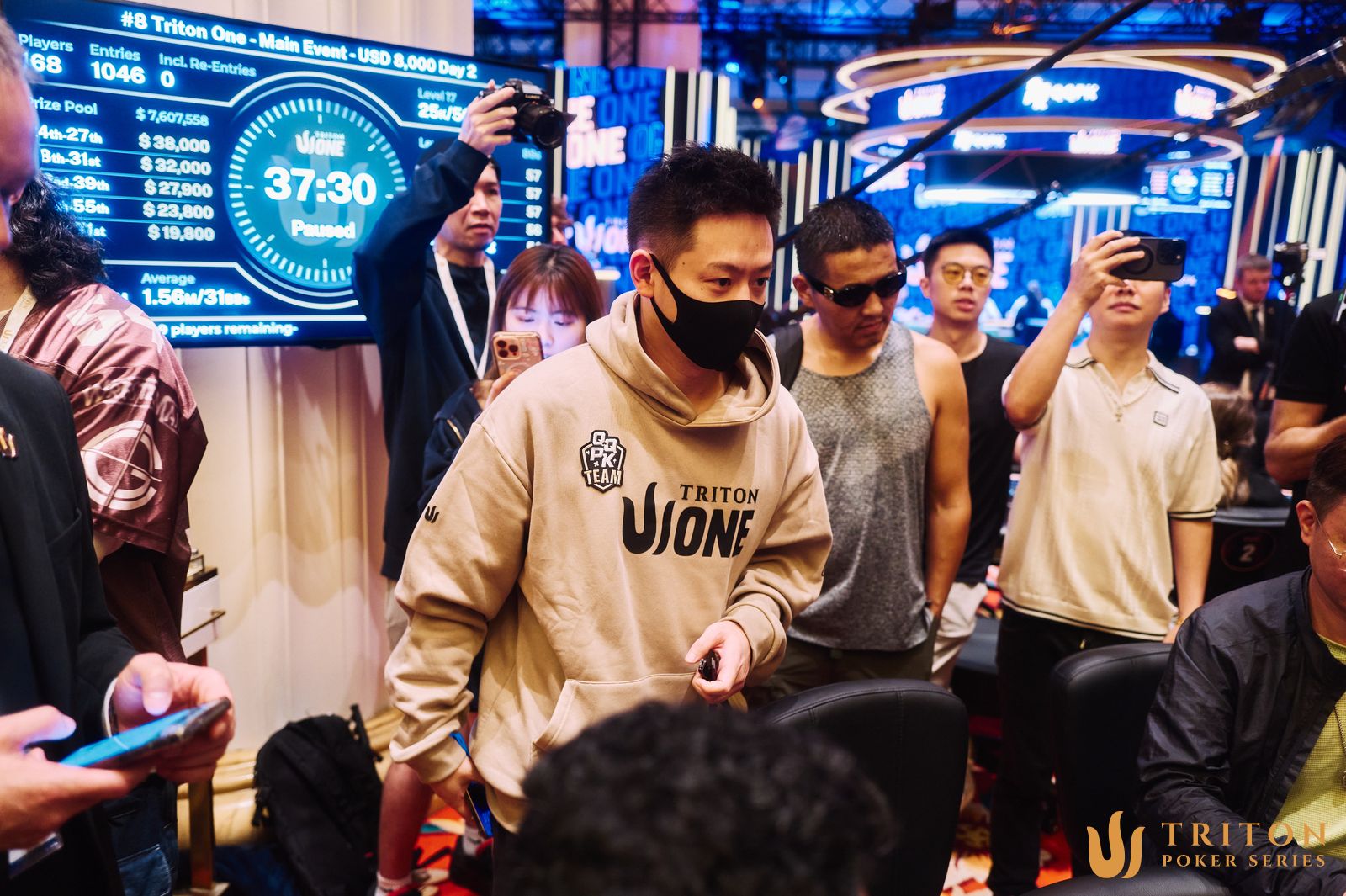

Yuan Xu becomes the bubble boy
Yuan's two opponents checked all the way through a board of QQ9104 and, after due pauses for action to complete elsewhere, the cards were on their backs. Yuan's 85 never really looked good enough, but it was Rezaei's 102 that technically prevailed. Yuan was the official bubble-boy, with the rest now guaranteed a maiden Triton ONE Main Event cash.
The remainder of Day 2 turned into a drawn-out attempt to progress to the last 16, with the day scheduled to end when only two tables remained. It then spilled into the third and final day, at which the initial focus was getting to a final.
After some typically high-pressure jousting, two pots essentially brought the field down to its last nine. The first was when Triton regular Punnat Punsri got queens to hold up against Michael Zhang's KJ, all-in pre-flop. And five hands later, Punsri snaffled the last of Zhang's chips too, with KJ beating Zhang's Q10. Zhang was out in 10th.
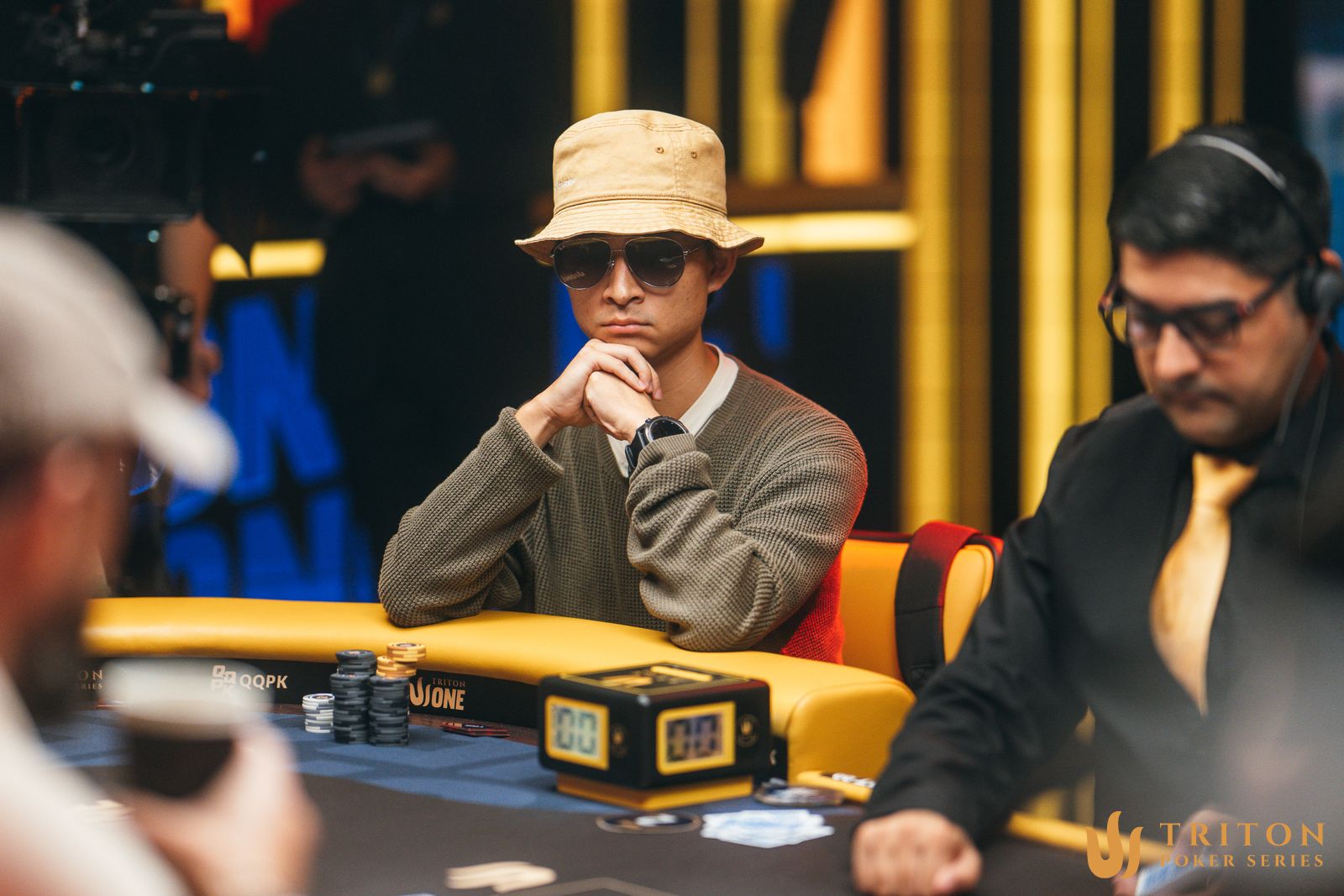

Michael Zhang falls just before the final
By this point, Japan's Daiki Shingae and Joshua Gebissa of Germany were essentially tied for the lead. Shingae had won an enormous pot from Yuefeng Pan earlier in the day, with AK beating AQ for a pot of more than 30 million chips. Gebissa had been up and down, but went on a steady surge to book a seat at the final.
They lined up as follows:
Daiki Shingae - 45,200,000 (75 BBs)
Joshua Gebissa - 45,000,000 (75 BBs)
Ruogu Wen - 40,600,000 (68 BBs)
Zhuo Dajie - 39,700,000 (66 BBs)
Punnat Punsri - 25,600,000 (43 BBs)
Artur Martirosian - 24,100,000 (40 BBs)
Sergi Petrushevskii - 15,300,000 (26 BBs)
Igor Yaroshevskyy - 13,100,000 (22 BBs)
Kaoru Kishimoto - 13,000,000 (22 BBs)
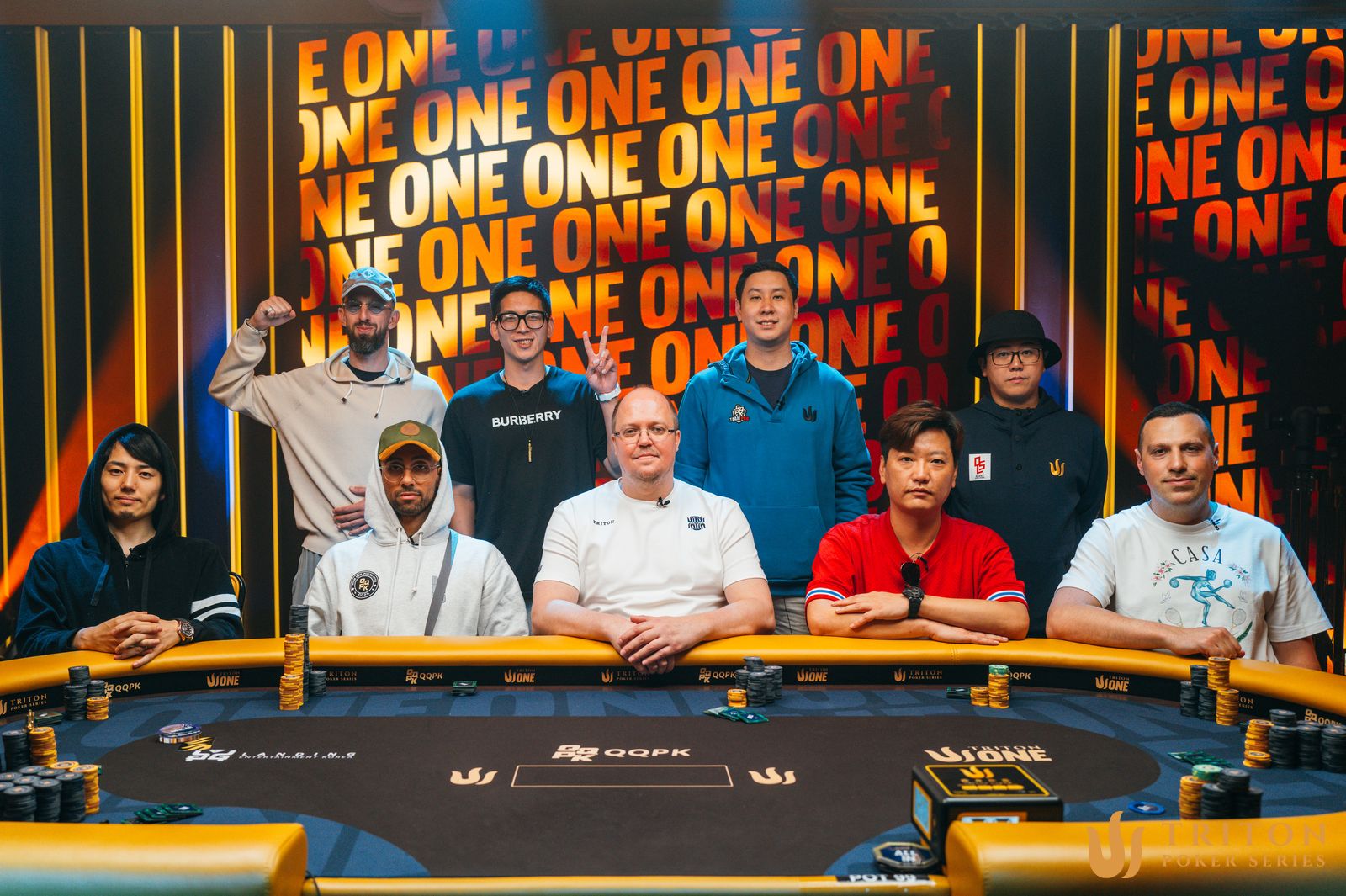

Triton One Main Event players (clockwise from back left): Igor Yaroshevskyy, Zhuo Dajie, Punnat Punsri, Daiki Shingae, Artur Martirosian, Ruogu Wen, Sergi Petrushevskii, Joshua Gebissa, Kaoru Kishimoto.
Play at the final table was delayed slightly as Punsri had gone MIA. When he returned after a tournament break, he was clutching a kid's teddy bear—a lucky charm that he now deposited on a table to his side.
Its good fortune worked immediately. On the very first hand, not only did Punsri look down at pocket aces in early position, but Sergi Petrushevskii found AK in the big blind, which was plenty good enough to put in a three-bet over Punsri's opening raise. Punsri played it cute and just called.
The flop of 53K sealed Petrushevskii fate and he bet his top-top. Punsri only called again.
Petrushevskii then shoved after the 8 turn and, with an over-pair backed up by the nut blocker, Punsri slammed the trap shut. Petrushevskii bust in ninth, his second cash of the Triton ONE festival, and earned $101,700.
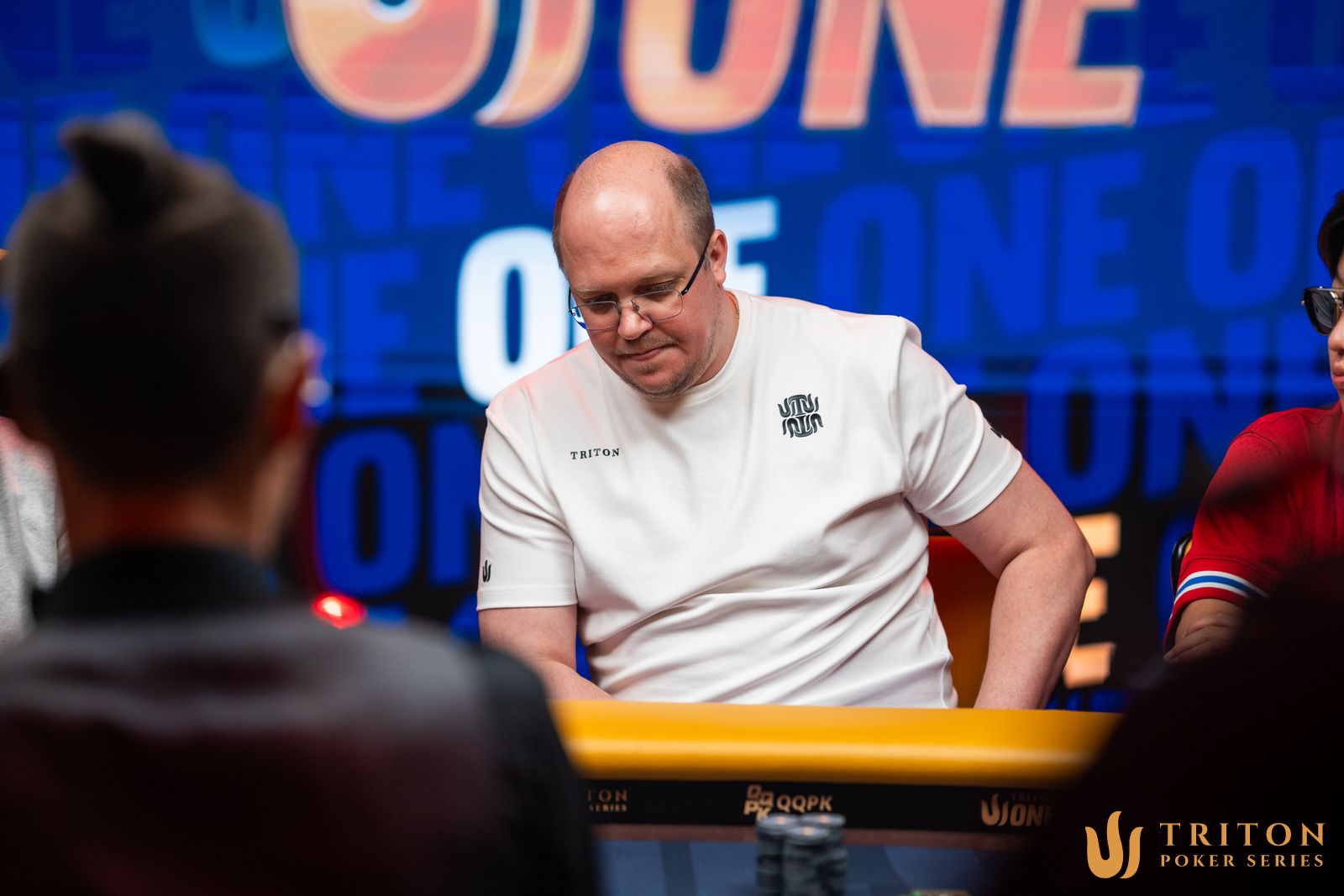

Sergei Petrushevskii, first out from the final
Both Igor Yaroshevskyy and Kaoru Kishimoto had trailed Petrushevskii in the counts coming to the final, so had enjoyed a ladder up after his elimination. But neither lasted much longer at the final table.
Yaroshevskyy was next out, and this was a tough one for him to take. Ruogo Wen opened from mid-position holding QJ and, after Daiki Shingae called on the button, Yaroshevskyy called from the big blind with 87. He saw the dream flop of 889.
Yaroshevskyy checked his trips, but neither opponent bet, which took them to the J turn. Yaroshevskyy now put out a third-pot bet, which only Wen called.
The J river was a dagger to Yaroshevskyy. Now sitting with a boat, he checked to Wen, who put him all-in. Yaroshevskyy was beating any flushes that got there on the end, but he was crucially inferior to the runner-runner boat Wen had now hit.
Yaroshevskyy, to his immense credit, did not call right away. He only had half the pot left in his stack; about eight blinds. He spent two time-bank chips. But he eventually felt he couldn't possibly fold and put forward one chip to confirm a call. He was dusted. The double Triton Super High Roller Series champion took $130,558 from this tournament.
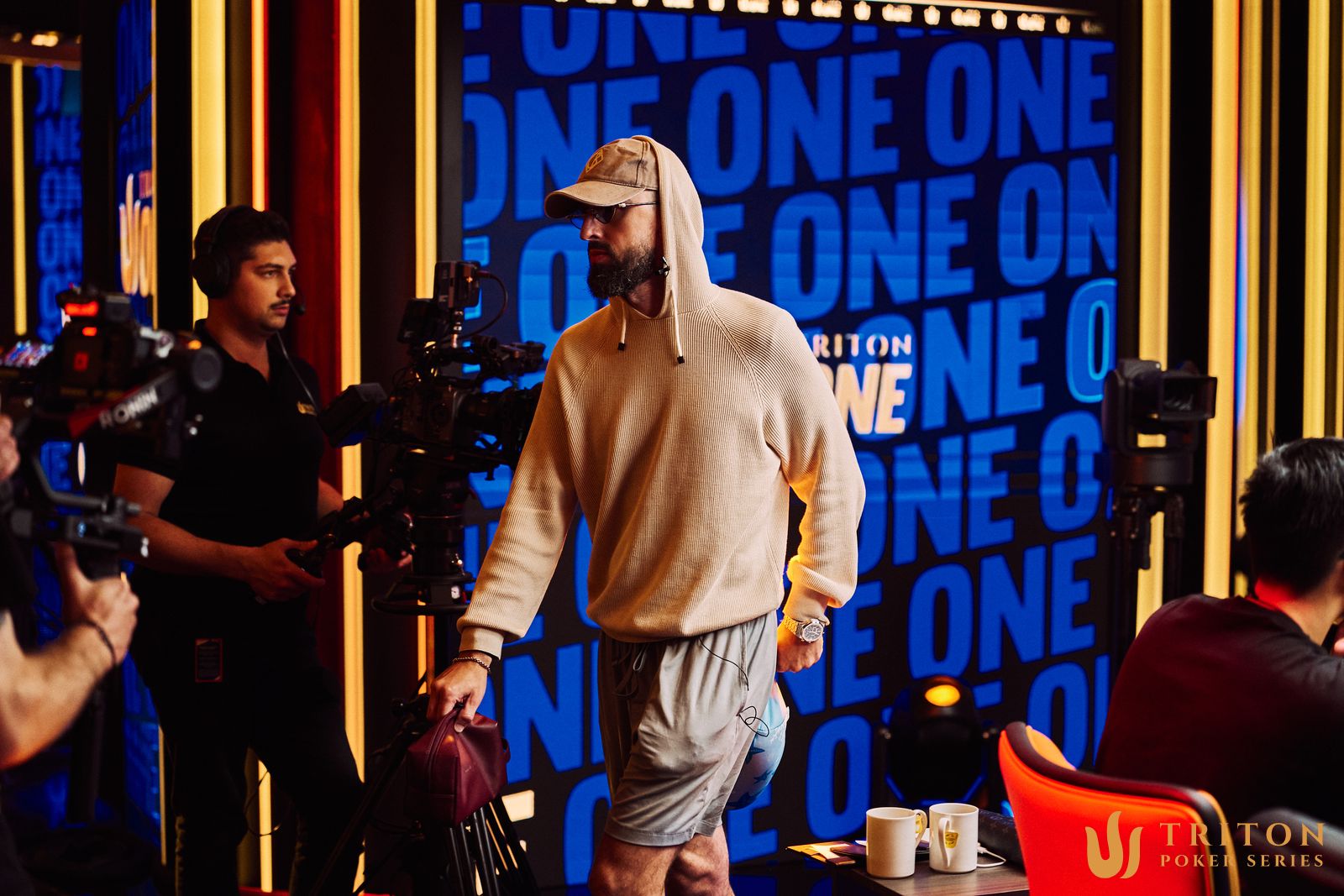

Igor Yaroshevskyy: Couldn't quite get away
Kishimoto bust on the very next hand. Having pulled off one power move at the final, three-bet jamming with A6 and folding out better, he got into trouble with K9 when he called from the big blind following Shingae's button open.
The dealer put the QJ5 on the table, and Kishimoto checked his gutshot. But after Shingae bet his over-cards, Kishimoto jammed his 14 blinds. Shingae could afford to call, and stuck the chips in. Already ahead, the Q turn and A river kept Shingae in the lead and spelled the end for Kishimoto.
This clash of the Japanese left Kishimoto looking for a $183,000 payout for seventh.
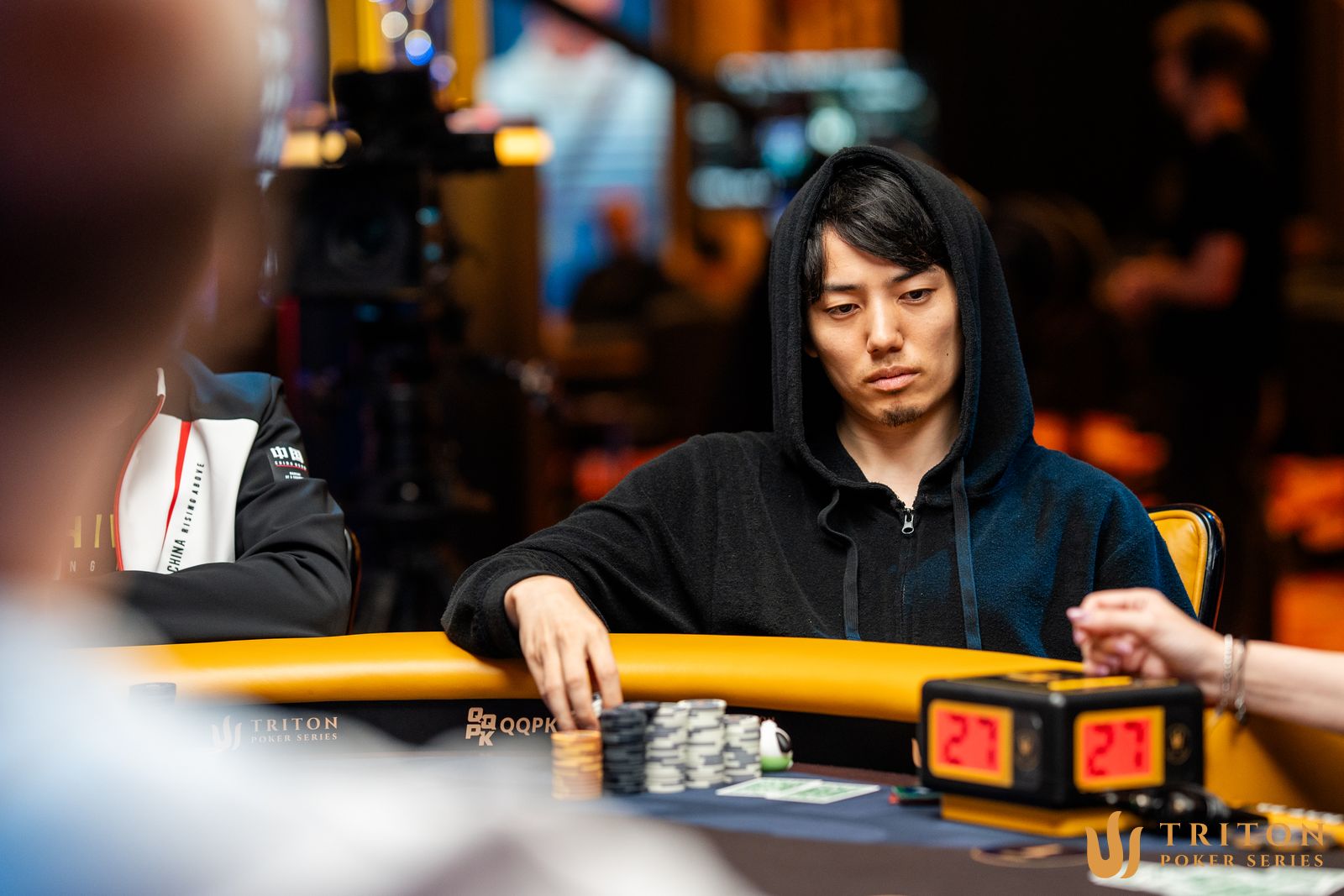

Kaoru Kishimoto bluffed into better
With six players left, the average stack was now 54 big blinds, which was still a ton of play. But things were about to get feisty.
Artur Martirosian, currently leading the Super High Roller Series Player of the Year race, did not earned his fearful reputation for no reason. If he sees a spot, he'll go for it, and while it's earned him enormous riches through the years, it doesn't always pay off.
His elimination in sixth place here will stand as a case in point. Martirosian opened A3 from the cutoff, and Punsri, a fellow Super High Roller regular, three-bet from the button. The rest of them left them to it, and Martirosian stuck in a four-bet. Punsri still wanted to play and five-bet. And Martirosian stuck in the rest as a six-bet jam.
You read it correctly, by the way, that Martirosian had A3.
Punsri called off to set up a near-100 big-blind pot, and his AK faded Martirosian's outs to win an absolute monster. Martirosian won $241,300, while the rest of the field breathed a sigh of relief.
Punsri now had a significant chip lead, and it only got even bigger after another set-up added Zhuo Dajie's entire stack to Punsri's.
This pot began with a raise from the button from Punsri, holding AJ, and two calls from the blinds: Shingae in the small and Zhou in the big. Punsri hit top pair on the J25 flop.
After two checks, Punsri bet, and Shingae folded. Zhuo, however, made a raise. Punsri three-bet and Zhuo jammed for all 48 blinds he had. He also had top pair, but his KJ was a pip inferior to Punsri's. Nothing changed after the turn and river, and Zhuo became Punsri's latest victim.
Zhuo won $328,000 for fifth.
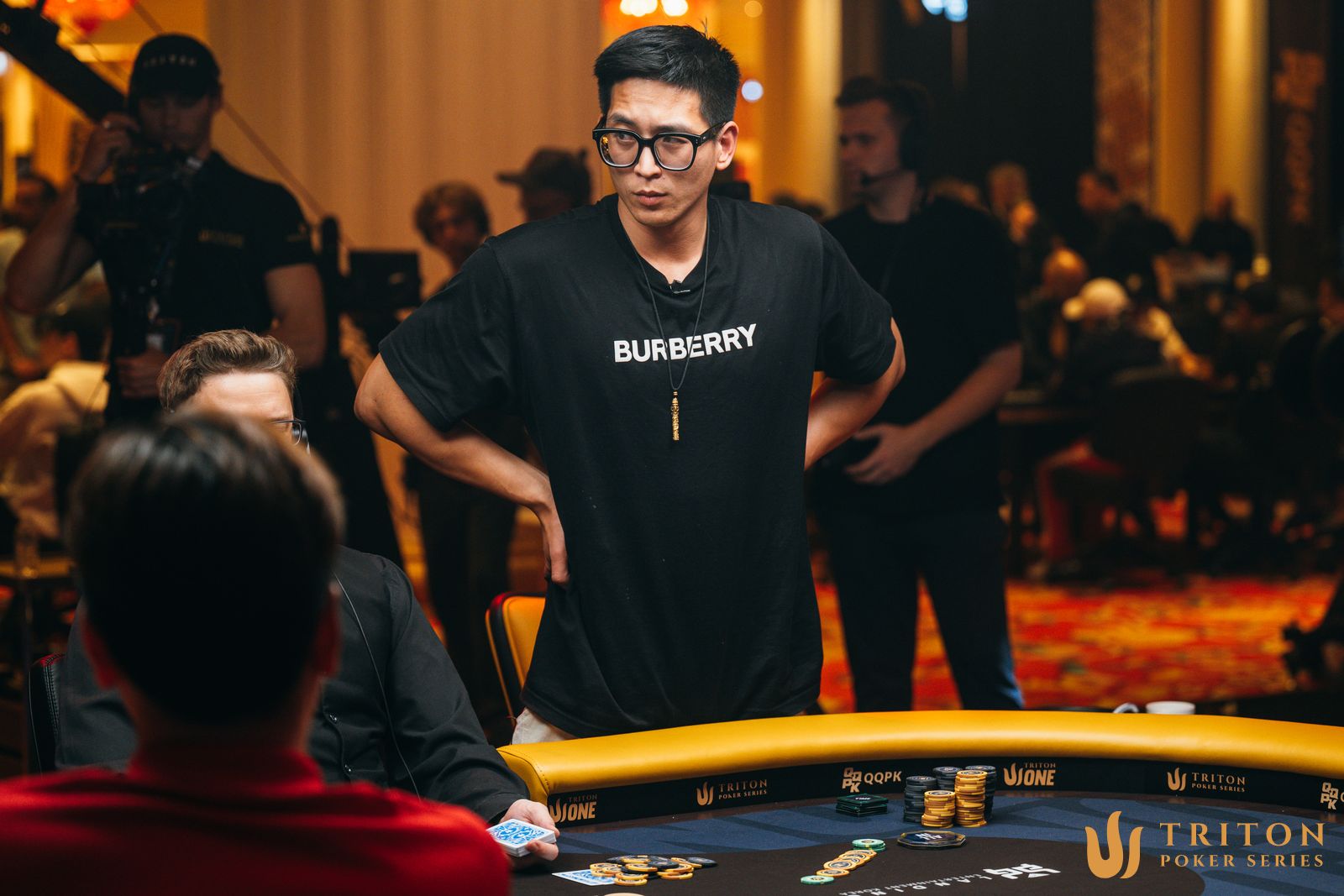

Zhuo Dajie's top pair was no good
Though Punsri now had more than half the chips in play, this was still a very deep final table. However, Ruogu Wen quickly followed Zhuo to the payouts desk.
Wen opened his button with KQ and Punsri called on the button. This time, however, it was Shingae's three bet in the big blind that was more significant. Shingae had pocket sixes to go with his 66 big blind stack.
Wen went for all of it. He jammed for 21 blinds more. Punsri shied away but Shingae didn't. His call set up a flip, won by the pocket pair after nothing of interest came on flop, turn or river.
Wen won $431,000 for fourth, standing up to reveal his "Sixers" T-shirt. Sixes were his undoing however. Shingae closed in on 100 blinds too.
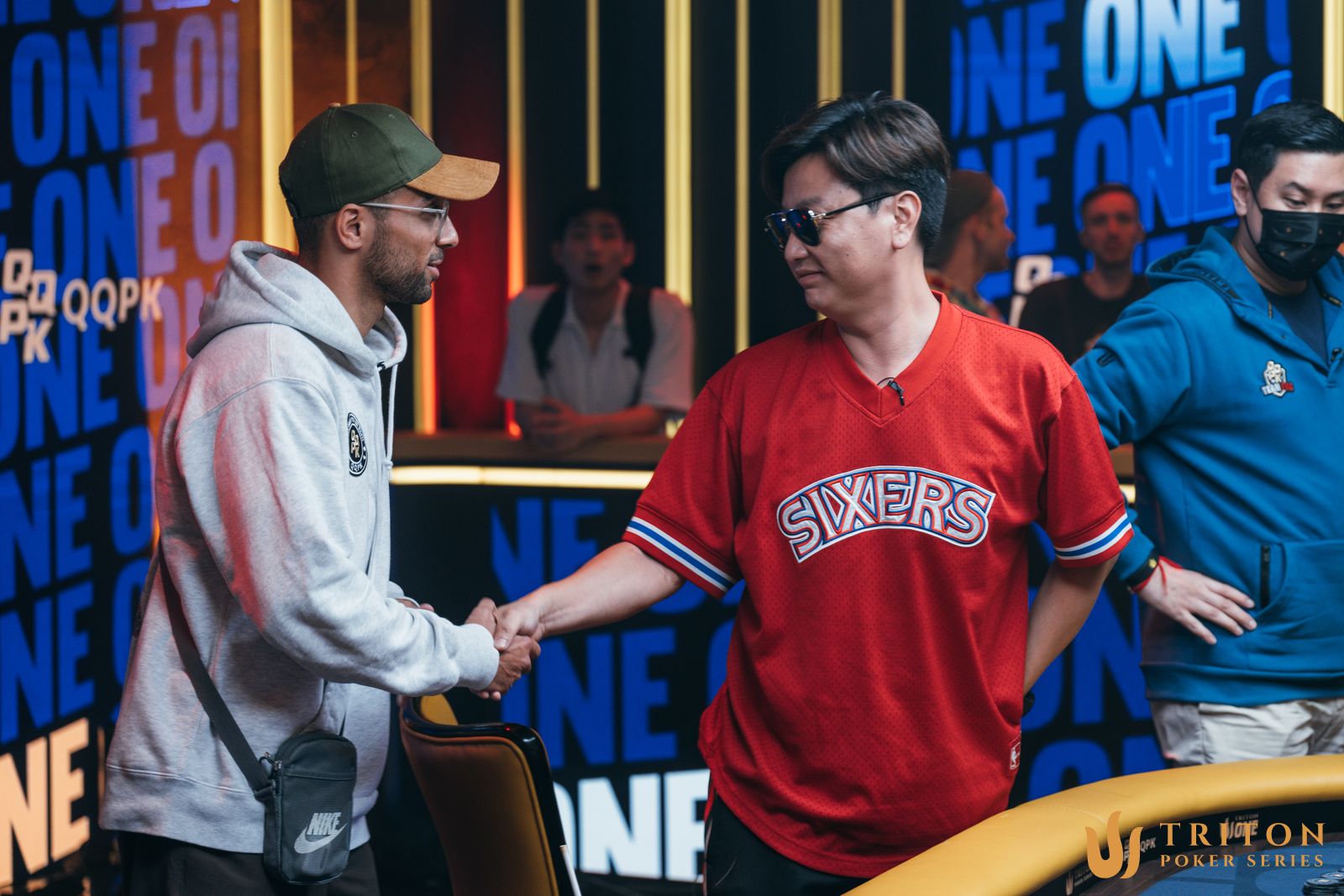

Ruogu "Sixers" Wen: Be careful what you wish for
Punsri had a big lead when players went on their first break from the final table. (It's true, all of the above happened before the event took a pause.) But when they came back, Shingae proved the lead was not unassailable. When he rivered a flush with 96 in a 20-blind pot, he nosed ahead, while Gebissa tried to keep himself afloat in a distant third place -- albeit with 30 blinds still.
Shingae edged further forward. Gebissa stayed alive. And then there was a massive explosion. Shingae opened his button with 86 and called after Punsri three-bet his big blind with K5. The flop was the innocuous 72Q and Punsri led for close to half the pot. Shingae was unconvinced and called.
The 5 gave Punsri a pair and Shingae a straight draw. Punsri checked it over to Shingae, and then called after Shingae took a stab. The 2 completed the board and Punsri checked again.
Shingae went for all of it. He was essentially playing the board but ripped in the covering stack instantly, putting all the heat back on Punsri. If he folded, Punsri would be left with 45 blinds. If he called and was wrong, he would be out.
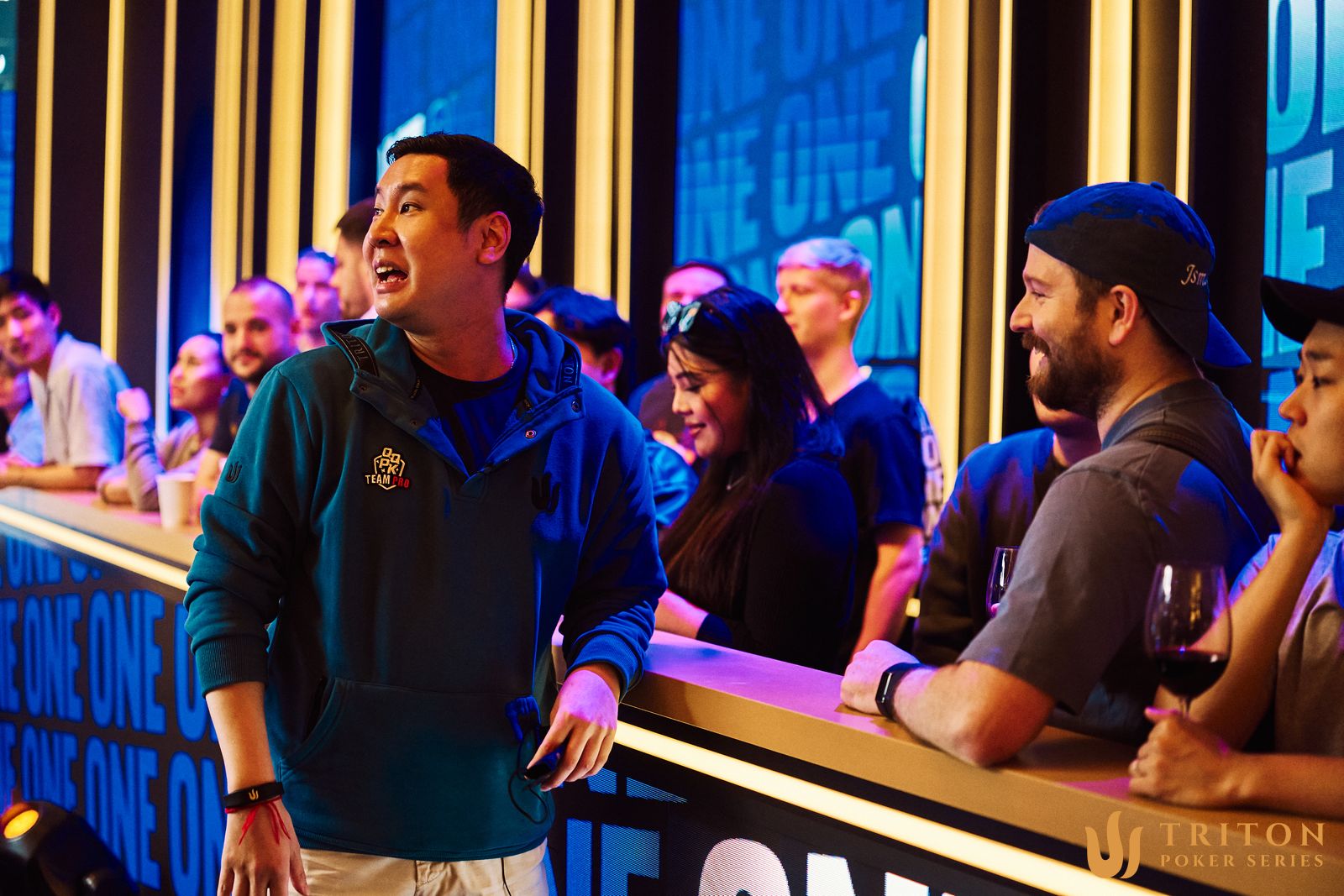

Punnat Punsri explains his big call to his rail
But he called. And he was right. After burning through his last two remaining time-bank extensions, Punsri put out the call and Shingae was forced to turn over his enormous bluff. Punsri's soul read gave him a massive double.
When Gebissa doubled through Shingae not long after -- KJ beating K3 -- the Japanese player was in terrible trouble. Although he managed to double a tiny stack once, he then ran into another gross position.
This was horrible. Shingae had three blinds and in they went with pocket kings. Gebissa found AQ and, of course, was happy to call from the small blind. Punsri left them to it.
The flop gave little indication of what was to come. It fell J86. Then although the [kid] turn gave Shingae a set, it actually gave Gebissa one more out. And he drilled it, the 10, on the river. That was a straight, and a terminal blow to Shingae. The rail erupted.
Shingae's nosedive from the chip lead was complete, and he headed to the rail in third for $573,000.
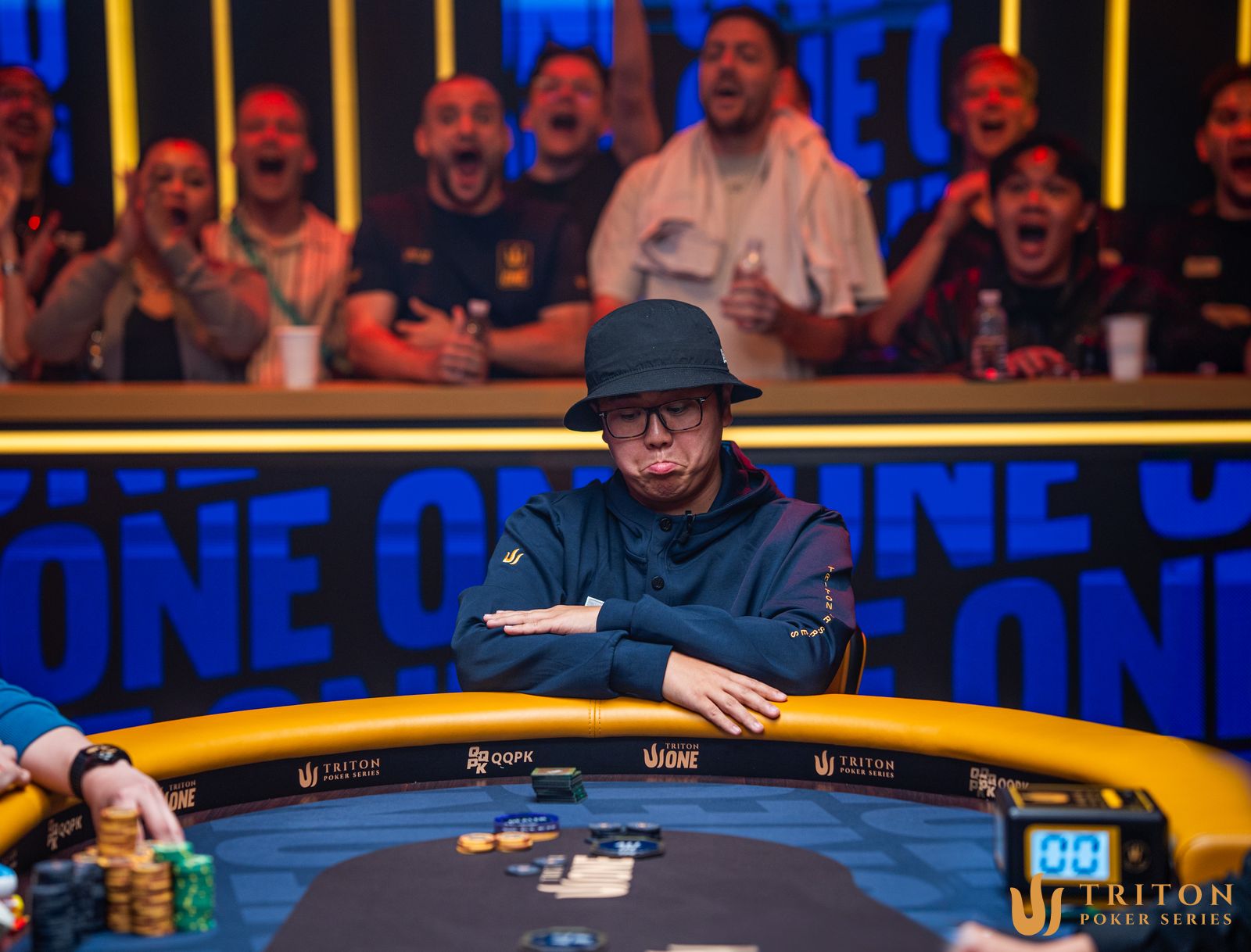

Daiki Shingae frowns; rail explodes in delight
Two players were left, but there was a significant chip disparity. Punsri had 129 blinds. Gebissa had 35. They beckoned Luca Vivaldi to the table to talk about numbers.
After a small amount of back and forth, they shook hands on a straight chip-chop. Punsri locked up $1,205,775. Gebissa would take $920,225. There was $55,000 to play for on the side — plus the distinction of becoming the first ever Triton ONE Main Event champion.
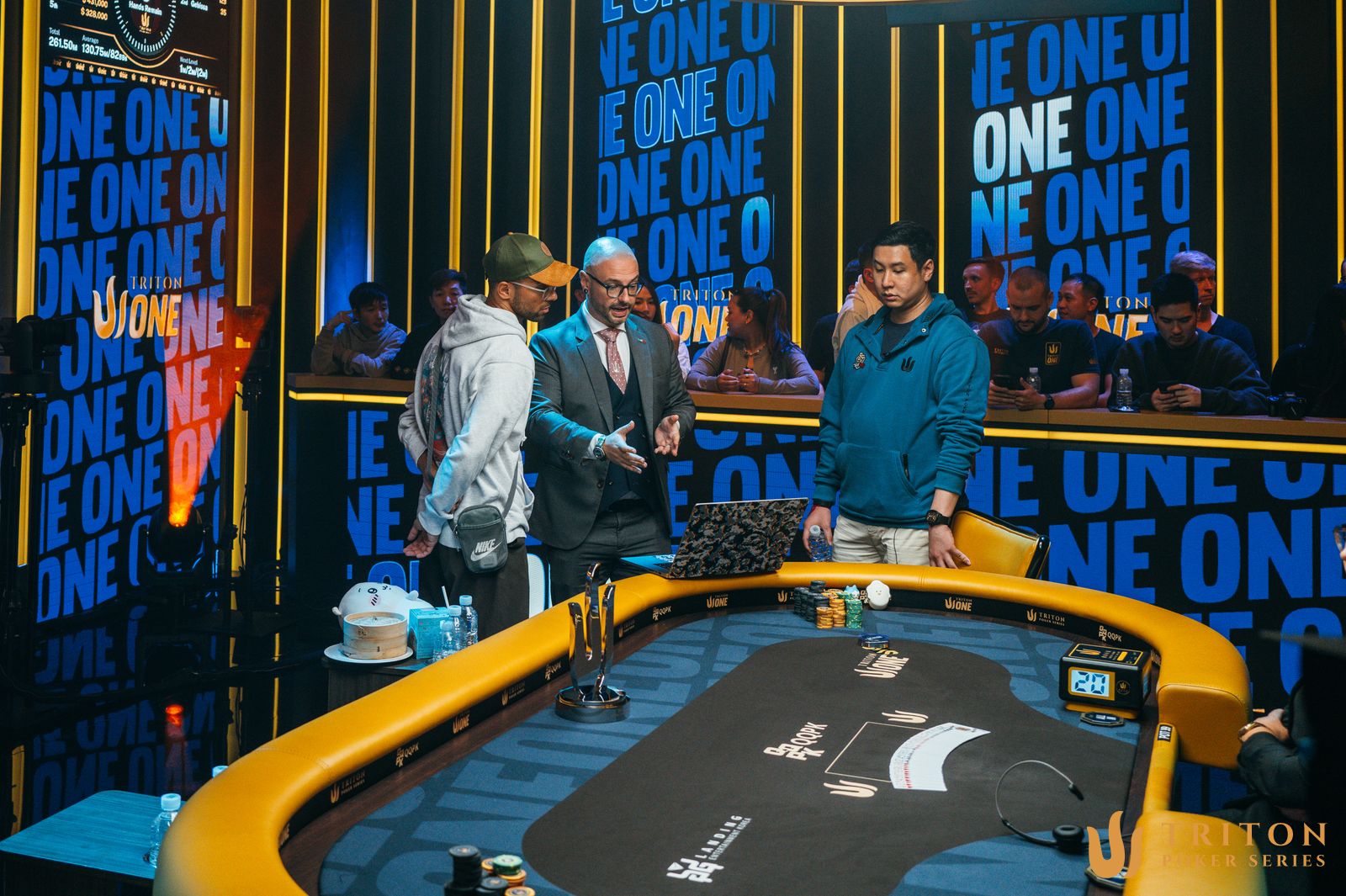

Punnat Punsri and Joshua Gerrisa discuss a deal
It didn't take long for the chips to go in. But the outcome had the potential to prolong proceedings significantly. Gebissa limped with 1010 and Punsri, finding A8 in the big blind, pushed all in. Gebissa had likely been hoping for this precise outcome and called for all of it.
Despite Jason Koon joining Danny Tang on the stage to root for Punsri, the Triton heavyweights couldn't call in the "ace from space". The board was all low and the tens held up. Gebissa took a big chunk out of Punsri's lead.
A pattern quickly established. Punsri won the small pots, but Gebissa doubled when he needed to. Punsri missed a flush draw holding 93 on a runout of 6QK2J but took a swing at it with a river shove. Gebissa likely knew that KQ was good enough and called.
That put Gebissa into the lead by a matter of a couple of blinds, with each of them holding more than 50.
But our pattern continued.
Punsri won some small pots to get back into the lead, but it wasn't quite big enough for him to feel anywhere close to comfortable about the next huge double. In this one, Punsri flopped two pair with his Q2. But Gebissa's A7 flopped trips. The board was 77Q.
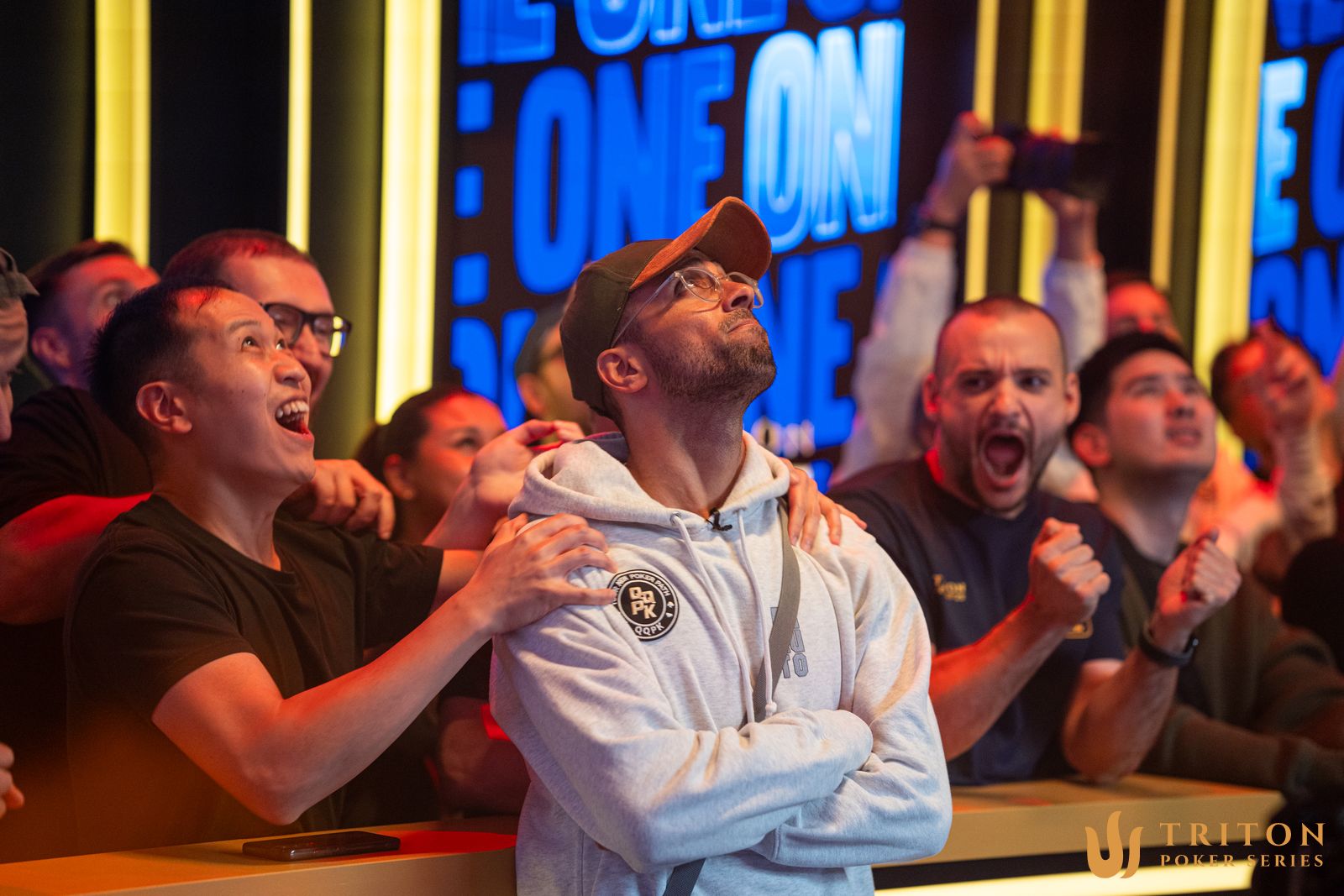

This was an enormous pot, and it left Punsri with fumes.
Though he then managed two doubles to get back involved, the final hand came about quickly. Punsri's J6 whiffed everything. Gebissa's 87 connected better with the 74A5Q run out.
And with that, a legend was born.
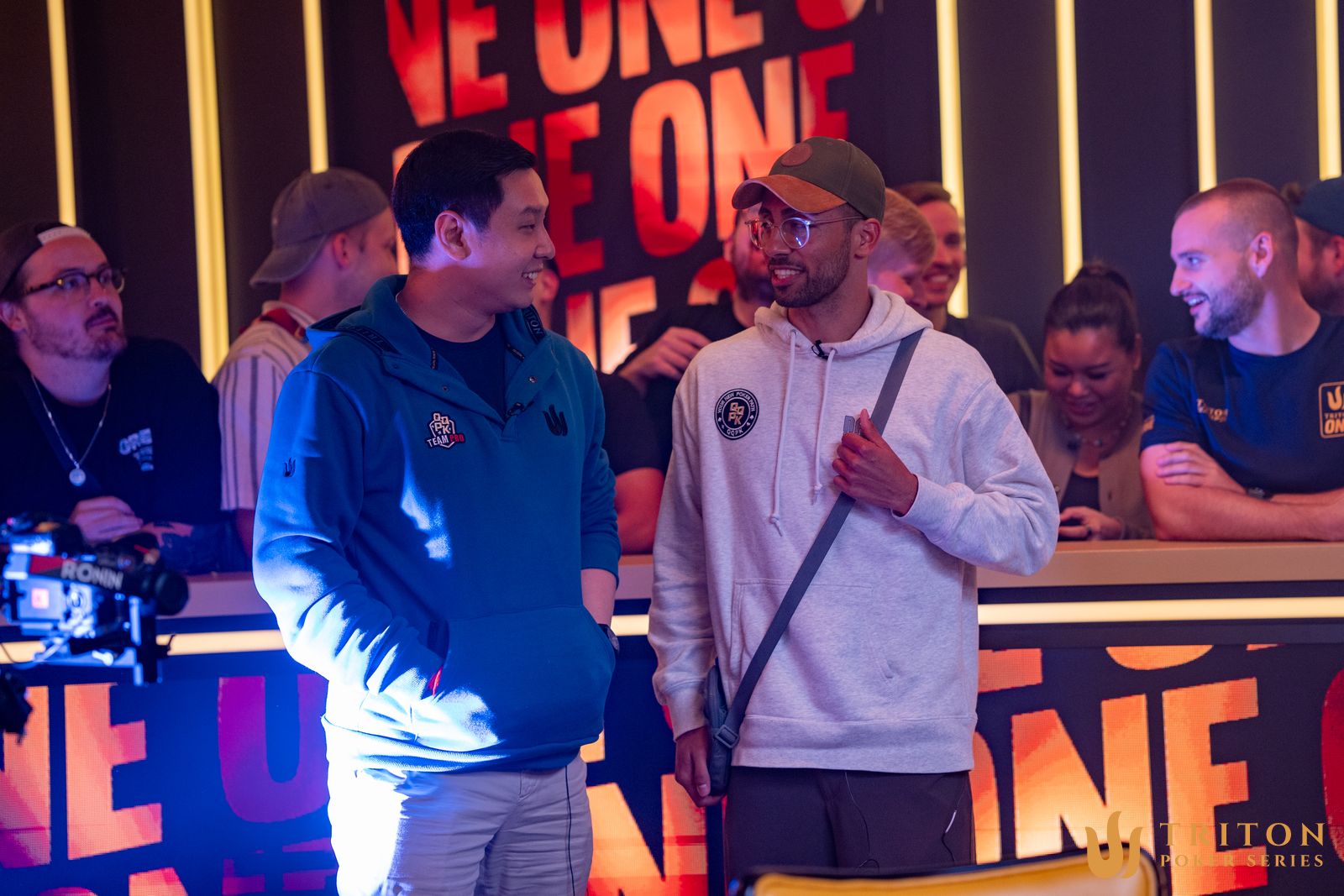

Punnat Punsri and Joshua Gebissa begin the post-mortem




